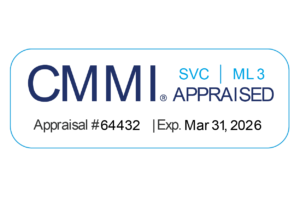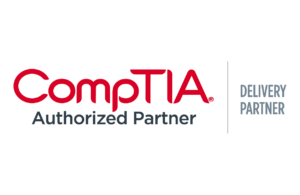Professional, Immersive and Operational Courses
The Cisco Certified Network Associate (CCNA) certification proves you have what it takes to navigate the ever-changing landscape of IT. The CCNA exam covers networking fundamentals, IP services, security fundamentals, automation, and programmability. Designed for agility and versatility, CCNA validates that you have the skills required to manage and optimize today’s most advanced networks.
CompTIA’s Network+ validates the knowledge and skills needed to troubleshoot, configure, and manage wired and wireless networks found in companies around the world. CompTIA Network+ certifies a professional level understanding of emerging technologies, including cloud and virtualization technologies.
CompTIA Security+ is the first cybersecurity certification a candidate should earn. It establishes the core knowledge required in the field and provides a springboard to intermediate-level cybersecurity jobs. CompTIA Security+ is compliant with ISO 17024 standards and approved by the U.S. DoD to meet directive 8140/8570.01-M requirements.
CompTIA Cybersecurity Analyst (CySA+) is a certification for cyber professionals tasked with incident detection, prevention, and response through continuous security monitoring.
The Certified Information Systems Security Professional (CISSP) is the world’s premier cybersecurity certification. CISSP is ideal for experienced security practitioners, managers and executives interested in proving their knowledge across a wide array of security practices and principles. Earning the CISSP proves you have what it takes to effectively design, implement, and manage a best-in-class cybersecurity program. With a CISSP, you validate your expertise and become an (ISC)² member, unlocking a broad array of exclusive resources, educational tools, and peer-to-peer networking opportunities.
The Information Systems Audit and Control Association (ISACA) Certified Information Systems Auditor (CISA) certification Certified Information Systems Auditor® (CISA®) is world-renowned as the standard of achievement for those who audit, control, monitor and assess an organization’s IT and business systems. If you are a mid-career professional, CISA can showcase your expertise and assert your ability to apply a risk-based approach to planning, executing, and reporting on audit engagements.
CompTIA Cloud+ is the only performance-based IT certification that views cloud-based infrastructure services in the context of broader IT systems operations regardless of the platform. Migrating to the cloud presents opportunities to deploy, optimize, and protect mission critical applications and data storage. CompTIA Cloud+ validates the technical skills needed to secure these valuable assets.
Data breaches, ransomware attacks and other constantly evolving security threats are top-of-mind for today’s IT professionals. With a Certified Information Security Manager® (CISM®) certification, you’ll learn how to assess risks, implement effective governance, and proactively respond to incidents.
The EC-Council Certified Ethical Hacker (C|EH) designation is the world’s primary ethical hacking certification. This credential is ideal for experienced security professionals who need hands-on experience and skills needed to identify exploitable vulnerabilities using ethical hacking best practices designed to test the effectiveness of security controls against simulated cyber threats.
The EC-Council Computer Hacking Forensic Investigator (C|HFI) is the only comprehensive ANSI accredited, lab focused program in the market that gives organizations vendor-neutral training in digital forensics. C|HFI provides curriculum that provides attendees with a firm grasp on digital forensics, technologies, and methodologies for conducting digital investigations.
Incident response and recovery is a key component to any cybersecurity program. The EC Council Certified Incident Handler (E|CIH) training program is designed to provide hands-on learning through labs to prepare incident handlers and other cybersecurity roles with the skills needed to contain, handle, and respond to cyber threats and attacks. This is a must have certification for those in the cyber incident response field.
CompTIA Linux+ validates the competencies required of an early career systems administrator supporting Linux systems. The new certification ensures that IT professionals, software developers, cybersecurity engineers and penetration testers have these necessary skills to support today’s tech systems.
Skilled project managers are in high demand. Project leaders are required in each industry and are used to manage people, processes, and the business environment at multiple levels. The Project Management Institute Project Management Professional (PMP)® certification represents an elite group of project managers. It validates a project leader’s skills and the capacity to perform predictive, agile, and hybrid management approaches to achieve organizational objectives.
Advanced cyber threats can compromise your network well before you use any IT product by targeting supply chain dependencies. The Cyber Supply Chain Risk Management (C-SCRM) course is an immersive and multi-disciplinary cyber security course designed to explore the process of identifying, assessing, and mitigating the risks associated with the global and distributed nature of ICT product and service supply chains.
Advanced persistent cyber threats have the potential to gain unauthorized system access even after cyber security controls have been applied. The Fundamentals of Cyber Resiliency Engineering course is an immersive and multi-disciplinary cyber security course designed to teach ICT supply chain, business continuity, critical infrastructure, network, and systems engineering courses of action to enable mission or business essential functions that depend on cyber resources in a threat contested cyber environment.
Governance, Risk, and Compliance (GRC) is designed for cyber and non-cyber managers who are responsible for applying policies, procedures, processes, and resources to identify, manage, and monitor cybersecurity risk to fulfill the organization’s regulatory, legal, and operational requirements.
The Linux and Windows OS Hardening courses are designed for System Administrators who are responsible for implementing cybersecurity benchmarks on Windows and Linux operating systems. OS hardening courses include dozens of hands-on security configuration exercises that apply CIS benchmarks, STIGs, and other best practice cyber risk controls. Exercises also include risk-based determinations prior to benchmark implementation to assist the system administrators with applying security controls during operational constraints.
The onslaught of Ransomware has plagued our society and has created anxiety for many private and public sector organizations. This cyber attack has been used against schools, hospitals, critical infrastructure sectors, banks, businesses, and many other organizations and individuals. The Ransomware Survival course is designed to equip organizations with practical strategies designed to lessen the likelihood and impact of these devastating attacks so that organizations can continue uninterrupted.
Cybersecurity Framework (CSF) training is designed for private sector and international organizations who are seeking a flexible and non-bureaucratic cybersecurity strategy that aligns cybersecurity activities with NIST, ISO, CIS and other best practices. CSF training includes detailed instruction and practical exercises to Identify, Protect, Detect, Respond, and Recover from cyber threats.
During the final stages of cyber incident response and recovery it is important that organizations understand the root causes behind the cyber-attack, how vulnerabilities were exploited, and learn more about the threat to continuously improve cyber risk mitigation activities. Digital Forensics is the primary tool that provides the analyst non-biased artifacts to be used as evidence for continuous improvement and for cyber-attack attribution. The Fundamentals of Digital Forensics course is designed to provide students with hands-on learning to investigate and recover from cyber incidents.
Cyber events and natural disasters are more common today than ever before. Having the training and experience needed to recover from these events prior to mission impact is critical. During the Incident Response and Disaster Recovery course, students will be exposed to processes, procedures, and exercises to predict, plan, and recover from cyber or natural events within established recovery time objectives. This course will address the human element, the cyber element, and the physical element of response and recovery.
Course covers:
Operations Security (OPSEC), Insider Threat Mitigation, Active Shooter Preparation, and Human Error Mitigation
Sometimes the most harmful and damaging threats originate from inside the organization itself from intentional or unintentional threat sources. Non-cyber threats such as poor Operations Security, Insider Threats, Active Shooter Concerns, and Human Error can result in immeasurable harm to organizations and employees.
The Operational Resilience Course is a jam-packed immersive course taught by leading experts in the field of OPSEC, Insider Threat Mitigation, Active Shooter Preparedness, and Human Error Mitigation. This course is a must for all organizations and employees, and is designed to provide students with tactics, strategies, and plans to quickly identify internal organizational threats and protect the organization’s reputation, sensitive data, and its most precious resource…its people.
Timely and accurate decision making are the traits of every great manager and analyst. However, cognitive biases, perceptual biases, contradictory data, large volumes of data, and incomplete information can result in poor business and operational decisions that can cost money, time, reputation, and in some cases, even lives. The Critical Thinking and Structured Analysis (CTSA) course is designed to help students improve their ability to analyze information and make difficult business and operational decisions. The course is perfect for all occupations, managers, and analysts who want to sharpen their decision-making skills.

CyberWerx Academy™ customizes the student learning experience with tailored and operationalized one-day to six-month individual and team training packages

CyberWerx® offers consulting services designed to provide short-term subject matter expertise in any cyber security or organizational resillience area of need

Rent classroom and training space for table-top exercises, wargaming, or off-site training and meetings

Engineer, deploy, and manage on-premises, cloud, and hybrid range solutions with tailored curriculum and tools developed for your mission requirements

Certificate No. UIT1149

Certificate No. UIT1148

Certificate No. US4504

Compliant

Appraisal # 64432

Delivery Partner